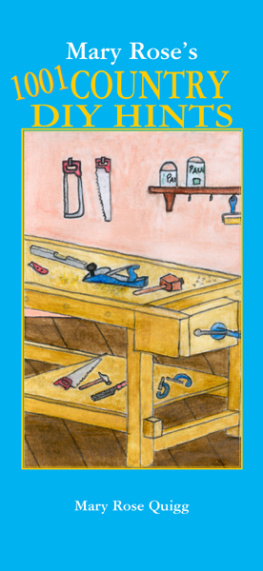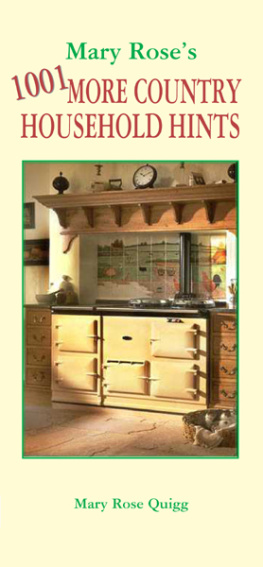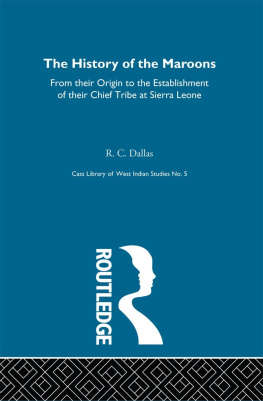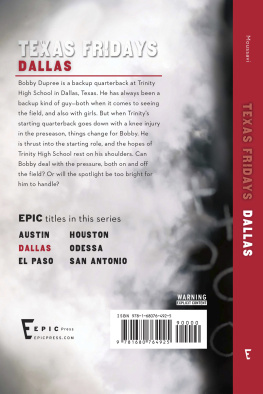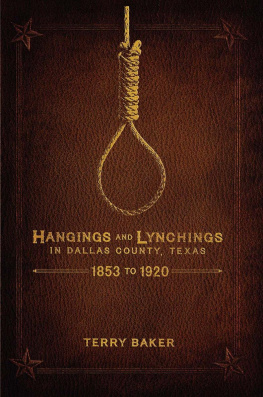Acknowledgments
Dedicated to John Patton, who was a fine newspaperman who encouraged me to write my column for the Oak Cliff Tribune, and to Donnie Gililland, a fine musician and writer who wrote most of the chapter headings in this book.
A big thanks to my family, my husband, Jack, my son, Phil, his wife, Karen, and little Scotty, and my daughter, Jill, and her husband, Ken Beam, and the kids, Daulton and Cassandra.
Also a big thanks to Mr. Ed Eakin, publisher, who has always believed me when I said, This is a great book!
Also a big thanks to the staff at the Oak Cliff Tribune who has continued to publish my column.
And too, a big thanks to the gang on the seventh floor, Dallas Public Library.
CHAPTER I
Some of Mothers Stories
MY ROOTS
After English and Prussian troops defeated Napoleon in 1815, the British people went on to bigger and better things. However, the Prussians and the Germans did not prosper as a whole. Some did, but the majority did not do well at all. There were several reasons for the discontent and misery amid the German people.
Steam had replaced the old fuels that were still being used in the industries of Germany. Also, the country had no port on the Atlantic which had become the waterway of the world. Feudal laws still existed, so these industrious people were trapped into poverty and stagnation. They were looking for a way out and it came in 1820, when Stephen F. Austin made the deal with the Mexican government to colonize Texas. A person could come in and claim the fine land offered in this southern section of North America.
Word about this deal got to Germany, and the people came. One German prince came and led his people into the best land of the whole area the Hill Country. This prince was Carl of Solms- Braunfels, and he and his bunch built the little city, New Braunfels. His city soon became one of the largest cities in Texas because of the ideal climate and abundant natural resources. Agriculture and industry thrived.
The Germans could do anything they were butchers, blacksmiths, bakers, cabinetmakers, coppersmiths, locksmiths, machinists, saddlers, tailors, shoemakers, tanners. They were ever so grateful for the new beginning and they cashed in on it. They became truly tough Texans who triumphed over epidemics and all sorts of hardships. Later, they even fought with Sam Houston for the Republic and they fought in the Civil War for the South.
My daddys family, the Braus and the Etzels, came from Germany in the midst of this Texas migration. They settled in Round Top, Fayette County, and prospered by raising cotton in the rich soil of the Hill Country. My mothers family on her mothers side, the Balitzs, wandered all the way up to Dallas after the Civil War. They had four daughters, Rosalie, my grandmother, Emma, Pauline, and Elsie. My mothers father, William Hass, appeared on the Dallas scene in the 1880s. Were not sure from whence he came. He just popped up in Dallas with his half brother, Frank Gerlach. They were German. Frank settled in the little town of Lisbon and opened a blacksmith shop. Later, he moved his shop to Main Street, Dallas. William opened the West End Bakery in the heart of Down-town Dallas. The brothers married Balitz girls. William married Rosalie, and Frank married Emma.
MY MOTHER LIVED DOWNTOWN
My mother was born in downtown Dallas, October 1, 1894. Her father owned and operated a bakery on Main Street across from the court house. The bakery was downstairs. The family was up-stairs. That was the way people lived in those days. Babies were born at home, so my mother was born upstairs over a bakery. Being a true Southern lady, she would say, Dont tell anyone I was born over a bakery. Thats common. Woe be to anyone who was common. According to my mother, the worst thing anyone could possibly be was common. Those people are common. Thats so common. I heard those expressions all of my life. Later on, my mother told everyone she was born over the bakery. It made her a Dallas pioneer. That was classy, and my mother was in constant pursuit of classiness!
Because Mother was born downtown and grew up downtown, she had great stories of early Dallas, and she told those stories over and over and over and over. The older she got, the more she told the stories. Did I tell you this story? Yes, Mother, youve told that story. Good, Im going to tell it again. I want to hear it myself.
Guess what? Im doing the same with my children today except, Im more direct and I hit where it hurts. Did I tell you this story? Yes, Mother, youve told that story. Well, Im going to tell it again, and if you dont listen, youre out of the will! Suddenly, I have everyones attention.
When my mother was a kid she often went to the Majestic Theatre on Elm Street to see vaudeville shows. One of the comedy skits she saw featured the usual, infamous baggy pants comedian. After a particular act, the funny man addressed the audience. Gee, I hope you like my little get up! My mother always remembered that phrase, and it became a family phrase. Everytime anyone of us did something creative, wed always say, Gee, I hope you like my little get up. Well, now, I bring you my story of Big D. Its not a comprehensive history of the city, although I must say, it borders on being one. Its an anecdotal history, and Im including some of the stories Ive told and some of the stories Ive heard. There are many, many more. I just happened to bring these to mind and together. And as the comedian would say, Gee, I hope you like my little get up!
THE BAKER, THE MILLER, AND THE JAMES BROTHERS
My grandfather, William Hass, a baker by trade, came to Dallas in 1880. First, he worked for a friend who owned the Star Bakery on Elm Street. Grandpa worked hard, saved his money, and finally opened his own bakery on Main Street across from Old Red. He called it the West End Bakery. The building was torn down to build the Kennedy Memorial, but, alas, Grandpa sold the property many years before. Had he held on to it, I might have a bundle of money. But as the old adage states, Money doesnt buy happiness. Ha! Ha! Ha!
Nevertheless, Grandpa prided himself in his fine bread, rolls, cakes and cookies. Later, there were other fine bakers who prospered in Dallas the Schepps and the Golmans to name two. But, Grandpa held his own with the competition.


